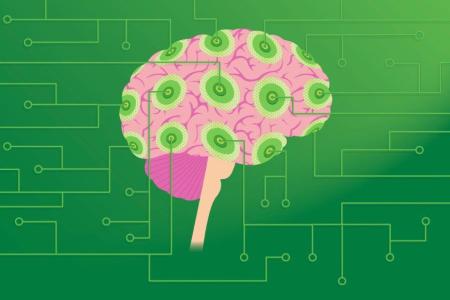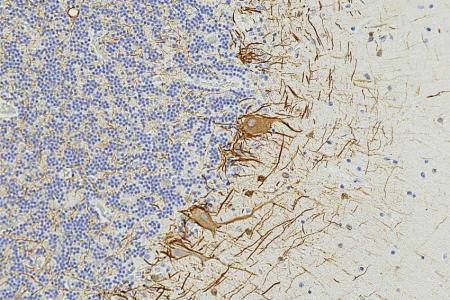From curing Alzheimer’s to preventing cancer and pneumonia, UCSF postdoctoral scholars tackle complex medical conditions at annual Postdoc Slam competition. A TED Talk-style presentation on the effects of tangled DNA strands took first place at this year's Postdoc Slam competition, which is held in celebration of National Postdoc Appreciation Week.
UCSF pediatric neurologist Hannah Shapiro shares research on the latest treatment that could lead to less medication for kids. A UCSF headache specialist discusses how to identify and treat children's headaches, emphasizing prevention and new approaches like virtual therapy.
A study screened dyes found in textiles and in the laser industry that can be used in imaging for preclinical studies to diagnose and differentiate between neurodegenerative diseases. Currently, dyes used in mouse studies cannot distinguish between different types of dementia.
With federal funding, UCSF researchers develop technology to deliver electrical pulses based on patients’ own brain waves. UCSF looks back on four ways it pioneered deep brain stimulation with the help of federal funding, helping patients with Parkinson’s Disease, chronic pain, depression, and more.
Scientists discover a protein that gets concentrated in the brain during aging, leading brain connections to wither and cognitive decline to accelerate - and a way to counter its effects.
The fellows will study how the experience of pain changes in pregnancy and how Zika affects the developing brain. Two new Pew Latin American fellows, Beatriz De Moraes, PhD, and Lilian Gomes de Oliveira, PhD, will each receive a $30,000 annual stipend for two years to support their work at the crossroads of immunology and neuroscience.
New research shows that an understudied area of the brain transforms our intended words into instructions for speech, overturning 160 years of scientific understanding. Researchers discovered that a different part of the brain handles stringing sounds and words together into coherent sentences. The information could help people who have had strokes and lost the ability to create sentences.
‘US News & World Report’ ranks UCSF Medical Center as No. 1 adult hospital (tied) in California, the best in California for cancer and neurology care, and among the nation’s leaders in 13 specialty areas. UCSF Medical Center has been ranked among the country’s best hospitals in adult care in U.S. News & World Report’s prestigious Best Hospitals survey.
Microglia, a type of brain immune cell, can gobble up amyloid beta protein, which clumps together into toxic aggregates during Alzheimer's disease.
A new study finds FDA approved drugs that reverse the gene expression signatures associated with Alzheimer’s. Scientists at UCSF and Gladstone Institutes have identified cancer drugs that promise to reverse the changes that occur in the brain during Alzheimer’s, potentially slowing or even reversing its symptoms.













